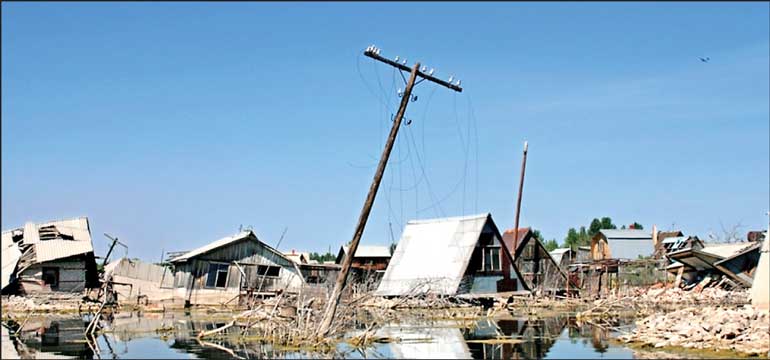Friday Feb 20, 2026
Friday Feb 20, 2026
Tuesday, 19 March 2024 00:00 - - {{hitsCtrl.values.hits}}

By John Beirne, Declan Magee, Agnes Surry and Ulrich Volz
https://www.asiapathways-adbi.org: Climate change poses a serious threat to the development of countries and can have material impacts on sovereign risk. Sovereign risk refers to the probability that a country may not be able to pay its debts. However, since the global financial crisis, interactions between fiscal balances, public and private debt, and the financial sector have proven to be very complex. Sovereign risk reflects this complexity.
For example, the devastating floods in Pakistan in 2022 were caused by heavier-than-usual monsoon rains and faster melting of glaciers. They killed more than 1,700 people, left half a million homeless, and cost around $30 billion. The events led to Moody’s revising downward Pakistan’s sovereign credit rating by one notch, citing amplified liquidity and debt sustainability risks alongside falling foreign exchange reserves.
Today, countries face two main climate-related risks. The first is physical risk, as the increasing number and intensity of extreme weather events have significant social and economic adverse effects. The second is transition risk, as the magnitude of the transition required to respond to climate emergencies is high. Implementing mitigation policies and developing more climate-friendly technologies create enormous challenges that can threaten a country’s social, political, economic, and financial stability.
Sovereign risk transmission channels
Climate-related risks adversely affect sovereign risk through seven transmission channels (Volz et al. 2020):
Understanding these transmission channels and mitigating the related risks are critical to containing sovereign risk and countries’ cost of borrowing. This is important for countries that are highly exposed to climate change, as they are the ones most in need of climate finance climate to build resilience but face the highest climate-related premia on their sovereign bond yields (Kling et al. 2018; Beirne et al. 2021).
The options ahead
Against this background, policy makers have a range of available policy options to mitigate climate-related sovereign risk. One key recommendation would be the preparation of climate vulnerability assessments to underpin the development of their national adaptation plans to climate-proof their economies and public finances. Once the assessments and plans are ready, it is suggested that policy makers mainstream climate risk analysis in public financial management, which includes budgeting processes, debt instruments, and revenue source diversification, among others.
Central banks and financial supervisors also have an important role to play in analyzing the macro financial risks arising from climate change. They also need to assess the impact of climate-related risks in their monetary and prudential frameworks through the development of ambitious climate disclosure standards, the implementation of climate stress tests to ensure the financial institutions’ health, and the integration of climate risks into financial supervision.
At the same time, governments and financial authorities should implement financial sector policies to scale-up investment in climate adaptation and resilience. It is also important to identify insurance solutions through local currency bond markets and further develop insurance markets, including fintech-based insurance solutions. In this regard, international financial institutions, such as the Asian Development Bank, have a special role to play in supporting climate-vulnerable countries by strengthening adaptive capacity and macro financial resilience. For instance, the Asian Development Bank offers a range of innovative instruments, such as green and blue finance bonds and projects to support countries in mitigating the adverse impact of climate risks on sovereign risk.
References
Beirne, J., N. Renzhi, and U. Volz. 2021. Feeling the Heat: Climate Risks and the Cost of Sovereign Borrowing. International Review of Economics & Finance 76(C): 920–936.
Kling, G., Y. Lo, V. Murinde, and U. Volz. 2018. Climate Vulnerability and the Cost of Debt. SOAS Centre for Global Finance Working Paper Series 12/2018. London: SOAS University of London.
International Energy Agency. 2023. Net Zero Roadmap: A Global Pathway to Keep the 1.5 °C Goal in Reach. Paris: International Energy Agency.
United Nations Environment Programme (UNEP). 2023. Adaptation Gap Report 2023. Geneva: UNEP.
Volz, U., J. Beirne, N. Ambrosio Preudhomme, A. Fenton, E. Mazzacurati, N. Renzhi, and J. Stampe. 2020. Climate Change and Sovereign Risk. London, Tokyo, Singapore, and Berkeley, CA: SOAS University of London, ADBI, World Wide Fund for Nature Singapore, and Four Twenty Seven.
John Beirne is a principal economist at the Asian Development Bank. Declan Magee is a principal economist in the Climate Change and Sustainable Development Department of the Asian Development Bank. Agnes Surry is Deputy Head of Capacity Building and Training and a senior economist at the Asian Development Bank Institute Ulrich Volz is a professor of economics and Director of the Centre for Sustainable Finance at SOAS University of London.